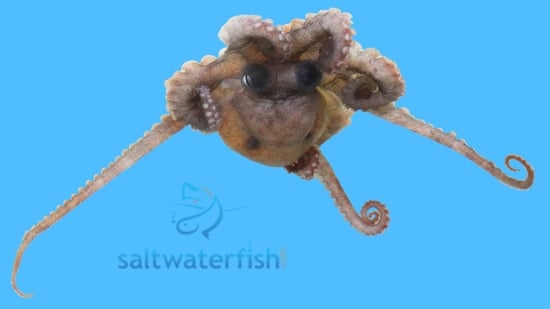Algae Octopus (Abdopus sp.)
Quick Stats:
- Care Level: Moderate
- Temperament: Peaceful
- Diet: Carnivore
- Reef Safe: Yes
- Minimum Tank Size: 120 gallons
- Maximum Size: Up to 12 inches
- Water Parameters: pH 8.1-8.4, Salinity 1.023-1.025, Temperature 75-80°F
Comprehensive Guide: Algae Octopus (Abdopus sp.)
The Algae Octopus, also known as Abdopus sp., is a fascinating species commonly found in saltwater aquariums. In this comprehensive guide, we will cover various aspects of keeping and caring for this octopus in your aquarium.
Habitat
The Algae Octopus is native to the Indo-Pacific region, including the waters around Indonesia, the Philippines, and Australia. It is commonly found in shallow coastal areas, particularly in seagrass beds and rocky reefs.
Reef Safe
The Algae Octopus is reef-safe, as it does not typically harm corals or other invertebrates. However, caution should be exercised when keeping it with small fish or shrimp, as they may be seen as potential prey.
Size
The Algae Octopus is a small species, reaching a maximum size of up to 12 inches. It has a slender body and long arms, which it uses for hunting and exploring its environment.
Temperament
The Algae Octopus is generally peaceful and can be kept with other non-aggressive fish and invertebrates. It is a curious and intelligent species, known for its ability to change color and camouflage itself to blend in with its surroundings.
Sexual Dimorphism
Sexual dimorphism in the Algae Octopus is not easily distinguishable, as both males and females have similar appearances. The only noticeable difference is during mating, where the male may display more elaborate color patterns.
Lifespan
The average lifespan of the Algae Octopus in captivity is around 1 to 2 years. However, with proper care and a suitable environment, some individuals have been known to live up to 3 years.
Diet in Aquariums
The Algae Octopus is a carnivorous species that primarily feeds on small crustaceans, such as shrimp and crabs. The aquarium can be fed a variety of live or frozen foods, including small pieces of fish, shrimp, and squid. It is important to provide a varied diet to ensure proper nutrition.
Aquascaping Recommendations
When setting up the aquarium for the Algae Octopus, it is recommended to provide plenty of hiding places, such as caves, rocks, and live plants. This will create a natural environment and allow the octopus to feel secure. A sandy substrate is also preferred, as it mimics the octopus’ natural habitat.
Captive Bred Availability
The Algae Octopus is not commonly available as captive-bred specimens. Most individuals found in the aquarium trade are wild-caught. It is essential to source octopuses from reputable suppliers to ensure they are collected sustainably and ethically.
Compatibility with Other Tankmates
The Algae Octopus can be kept with other peaceful fish and invertebrates that are not small enough to be seen as prey. Here are five specific tankmates that are a good choice:
- Damselfish: These colorful and hardy fish make excellent tankmates for the Algae Octopus. They are generally peaceful and can tolerate the octopus’ presence.
- Sea Cucumbers: They are known for their vibrant colors and fascinating behavior. They are compatible with the Algae Octopus and coexist peacefully in the same tank.
- Nudibranchs: Sea Slugs are scavengers that help clean up the aquarium. They are not considered a threat to the Algae Octopus and can be kept together.
- Soft Corals: Many soft corals, such as mushrooms and zoanthids, can be kept with the Algae Octopus. They provide additional hiding places and add beauty to the aquarium.
- Macroalgae: They help control algae growth and can be used for camouflage and enrichment.
Other Common Names
The Algae Octopus is also known by other common names, including Algae Reef Octopus and Algae Octopus.
Why Buy from Reefs4Less.com
Reefs4Less.com is a reputable online saltwater aquarium livestock and supplies supplier. They offer a wide selection of healthy and ethically sourced marine species, including the Algae Octopus. With their expertise and commitment to customer satisfaction, Reefs4Less.com is a trusted choice for saltwater aquarium enthusiasts.
Popular Questions and Answers
Q: Can the Algae Octopus change its color?
A: The Algae Octopus is known for its ability to change color and camouflage itself to match its surroundings. This helps it blend in and avoid predators.
Q: How often should I feed my Algae Octopus?
A: It is recommended to feed the Algae Octopus once or twice a day, offering a variety of small live or frozen foods. Monitor its feeding behavior and adjust the amount accordingly.
Q: Can the Algae Octopus escape from the aquarium?
A: The Algae Octopus is a brilliant and agile species, capable of squeezing through small openings. It is important to secure the aquarium with a tight-fitting lid to prevent escapes.
Q: Can the Algae Octopus be kept in a reef tank?
A: The Algae Octopus is considered reef-safe and can be kept in a reef tank. However, caution should be exercised when keeping it with small fish or shrimp, as they may be seen as potential prey.
Q: How can I provide enrichment for my Algae Octopus?
A: Enrichment can be provided through puzzle feeders, hiding places, and offering live foods that require hunting. This helps stimulate the octopus’ natural behaviors and keeps it mentally and physically active.


Reviews
There are no reviews yet.